

When you experience stress, it makes your heart pound, your breathing quickens and your palms start to sweat. Many of us see stress as the 'enemy' but struggle with finding the appropriate strategies to 'defeat it'. In which, resulting in long term impacts on our mental and physical health.
This resource page provides comprehensive information on stress in teenagers in hope to help them better understand it, hence better deal with it. From containing facts, examples and strategies, I hope that this page can help you become a happier and healthier person.
**Tips from the creator: To cater to the different learning styles, I have included a variety of sources (articles, videos and pictures). Please feel free to scroll to the bottom of the page for the list of resources.
How stressed are you? Quiz on stress levels. Is there too much stress in your life?
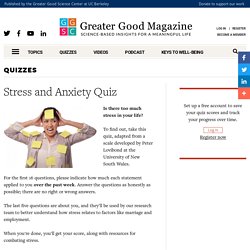
To find out, take this quiz, adapted from a scale developed by Peter Lovibond at the University of New South Wales. For the first 16 questions, please indicate how much each statement applied to you over the past week. Answer the questions as honestly as possible; there are no right or wrong answers. The last five questions are about you, and they'll be used by our research team to better understand how stress relates to factors like marriage and employment.
When you're done, you'll get your score, along with resources for combating stress. Any responses submitted here will never be shared with any organization outside the Greater Good Science Center under any circumstances, ever. Adapted from: Lovibond, P. Embed This Quiz on Your Web Site Copy this HTML code and paste it into your Web page wherever you would like the quiz to appear. Stress for everyone. The basics of stress. Stress is a situation that triggers a particular biological response.
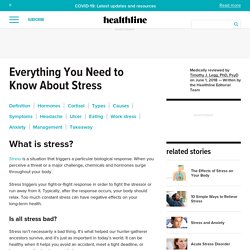
When you perceive a threat or a major challenge, chemicals and hormones surge throughout your body. Characteristics of stress. What is stress? How stress affects your brain. 3 types of stress. Overview on stress in teenagers. Teens talk about stress. What is teenage stress? Teenage stress: what is it?
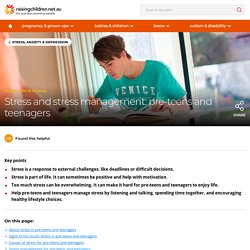
Stress in teenagers – and anyone – can be unpleasant, but it’s not necessarily a bad thing. Stress is the way your body responds to challenges and gets you ready to face them with attention, energy and strength. When you feel you can cope with these challenges, stress gets you ready for action and gives you the motivation to get things done. Everyone experiences stress. There’s nothing wrong with your teenage child if he’s stressed. Why are teenagers more stressed than ever? Parents might be mindful of buffering their own stress from their teens.
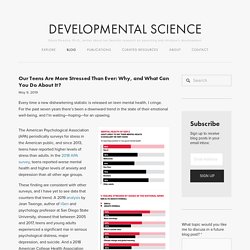
True, the parental brain has evolved to scan the environment for threats. But if parents pass on their stress, children can become overly stress-reactive, vigilant, and stress-sensitive. On the other hand, passing on constructive coping strategies is helpful. Building emotional intelligence skills is always important, too. Every teen will benefit from a) the ability to be aware of their feelings and b) having strategies for regulation. Resurrecting an old theory: Healthy identity development. Pressures teens face in today’s fast-paced world. Teens are under more stress today than ever before.
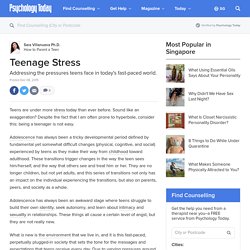
Sound like an exaggeration? Despite the fact that I am often prone to hyperbole, consider this: being a teenager is not easy. Adolescence has always been a tricky developmental period defined by fundamental yet somewhat difficult changes (physical, cognitive, and social) experienced by teens as they make their way from childhood toward adulthood.
These transitions trigger changes in the way the teen sees him/herself, and the way that others see and treat him or her. 6 Common triggers of teen stress. Signs and symptoms of teenage stress. Stress and anxiety in the digital age. Examples of teenage stress today. Teen stress from a teen perspective. More teens in Singapore seeking help for school stress. SINGAPORE (THE NEW PAPER) - More teenagers from top schools are seeking help at the Institute of Mental Health (IMH) for school-related stress.

IMH said that stress-related, anxiety and depressive disorders are common conditions seen at its Child Guidance Clinics, which treat children aged six to 18. The clinics saw an average of about 2,400 new cases every year from 2012 to 2017. Since IMH does not track the causes of the disorders, it does not have statistics on cases related to school stress. However, Dr Lim Choon Guan, senior consultant and deputy chief of IMH's department of developmental psychiatry, said: "Over the past few years, I have seen more teenagers in our clinic who are from top schools and report experiencing school-related stress. " Replying to The New Paper's queries, Dr Lim said this trend does not necessarily mean more youth are feeling stressed about their studies but suggests they are more willing to seek help. This may lead them to have unrealistic expectations. More children and teens are stressed out.
Last year, a Primary 5 pupil fell 17 floors from his bedroom window on the day he was supposed to take his exam papers home.
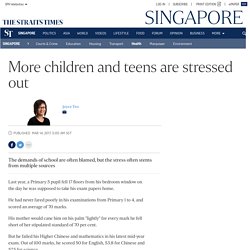
He had never fared poorly in his examinations from Primary 1 to 4, and scored an average of 70 marks. His mother would cane him on his palm "lightly" for every mark he fell short of her stipulated standard of 70 per cent. But he failed his Higher Chinese and mathematics in his latest mid-year exam. Out of 100 marks, he scored 50 for English, 53.8 for Chinese and 57.5 for science. This case shows what too much stress can lead to. BE THERE FOR THEMWe need to be there for teenagers when they are hurt emotionally, when they are sad and when they are celebrating.ASSOCIATE PROFESSOR JOHN WONG, head of the National University Hospital's psychological medicine department.
Teens 'more depressed and sleeping less' Image copyright Getty Images Adolescents are more likely to feel depressed and self-harm, and are less likely to get a full night's sleep, than 10 years ago, a study suggests.
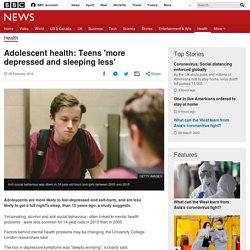
Yet smoking, alcohol and anti-social behaviour - often linked to mental health problems - were less common for 14-year-olds in 2015 than in 2005. Factors behind mental health problems may be changing, the University College London researchers said. The rise in depressive symptoms was "deeply worrying", a charity said. Researchers from London and Liverpool analysed data from two large cohorts of 14-year-olds - the first group from around Bristol, born in 1991-92, and the second from across the UK, born in 2000-01.
There were 5,600 young people surveyed in the first group and 11,000 in the second. Teen stress rivals that of adults. If you think you're stressed out, imagine being a teenager in today's society.
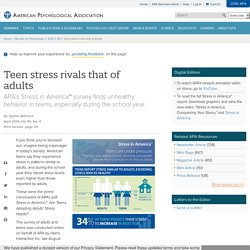
American teens say they experience stress in patterns similar to adults, and during the school year they report stress levels even higher than those reported by adults. These were the prime conclusions of APA's poll Stress in America™: Are Teens Adopting Adults' Stress Habits? The survey of adults and teens was conducted online on behalf of APA by Harris Interactive Inc. last August. Teens reported that their stress levels during the school year far exceeded what they believe to be healthy (5.8 vs. 3.9 on a 10-point scale) and topped adults' average reported stress levels (5.8 for teens vs. 5.1 for adults). Even during the summer — from Aug. 3 to Aug. 31, 2013, when interviewing took place — teens reported their stress during the prior month at levels higher than what they believe is healthy (4.6 vs. 3.9 on a 10-point scale). Statistics on teenage stress by digital media. Why is it important to manage stress?
Interdisciplinary framework on stress and adolescent well-being. Stress response and the adolescent brain. The impact of stress on students. Methods A single author (MP) searched PubMed and Google Scholar for peer-reviewed articles published at any time in English.
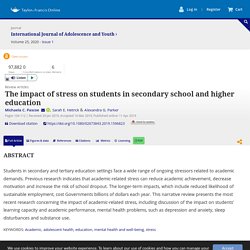
Search terms included academic, school, university, stress, mental health, depression, anxiety, youth, young people, resilience, stress management, stress education, substance use, sleep, drop-out, physical health with a combination of any and/or all of the preceding terms. A snowball strategy allowed for examination of references in identified articles, and inclusion of additional articles as appropriate. The author reviewed all potential articles for inclusion. Articles from all countries were included in this narrative review, if a school based (secondary [as defined at grade 7 or higher] or university) population was included and the study assessed the impact of stress on student mental health, substance use, sleep, dropout rates, physical activity or academic outcomes. Symptoms of teenage stress. How stress affects your body.
How stress is killing us. Problems faced in stress management. Coping with stress. Keep your stress under control. Feeling like there are too many pressures and demands on you? Losing sleep worrying about tests and schoolwork? Eating on the run because your schedule is just too busy? You're not alone. Everyone feels stressed out at times — adults, teens, and even kids. Stress management for teens. In the short term, stress can push a child to practice for her piano recital or inspire a teen to study when he’d rather be out with friends. But chronic stress is different. Stress tips infographic. Adolescents coping with stress. Coping with exam stress. A little stress can be a good thing: it can be the motivational push that we need to get things done.
However, sometimes, dealing with stress (especially during exam season) can be a difficult thing to do. And, with an estimated 20-50% annual increase of university students seeking help for studies-related mental health issues, it's clear that we're under more pressure than ever before. So, here to your rescue are seven tips to help you through the stressful exam period. 1.
How to manage the digital-related stress. Managing social media stress with mindfulness. It’s hard to imagine life without social media. It has become essential to connecting with our friends, getting updates about what’s going on in the world and being entertained. We can barely remember (if we’re old enough to remember!) How we stayed in touch without it.
But teens and young adults are increasingly reporting that social media can also be a source of stress. What we hear a lot about, especially from teenagers, is that when they’re scrolling through feeds they are often (consciously or unconsciously) comparing themselves to others. But it can also hurt your self-esteem when your life doesn’t feel as perfect as everyone else’s looks. Similarly, people are talking so much about the fear of missing out that there’s an acronym for it. 6 tips for dealing with study stress. Understanding your stress. How to make stress your friend.
All Videos. All Pictures.